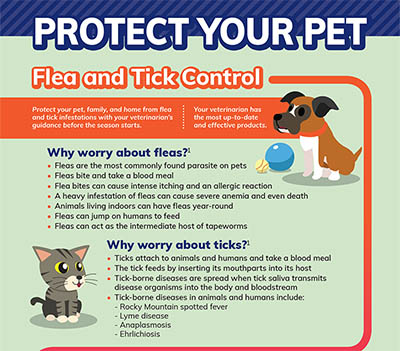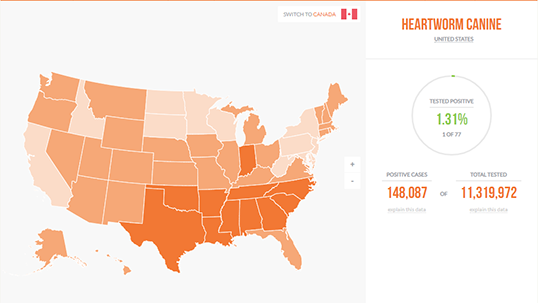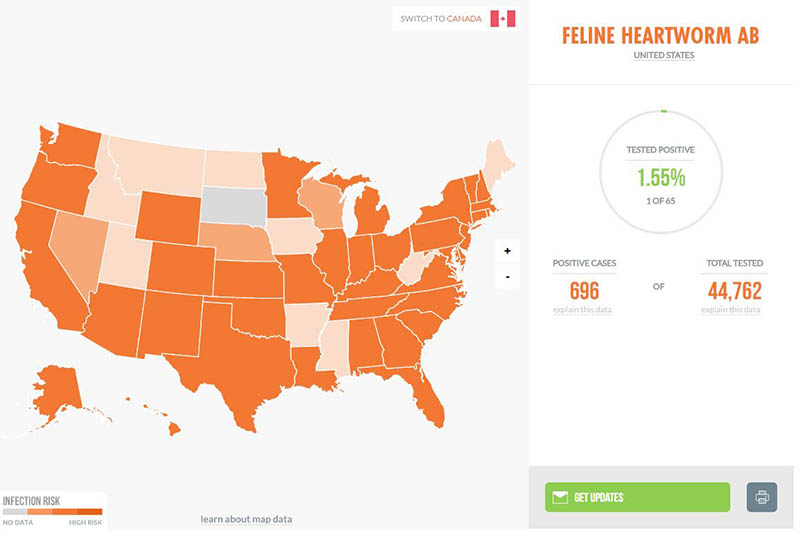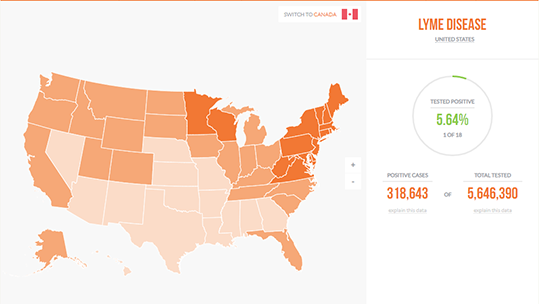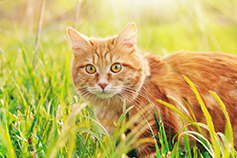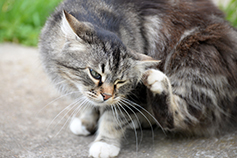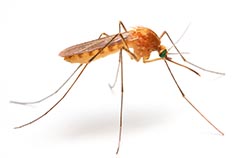Parasites and Pets
Parasite protection is important, but it’s hard to keep up with the latest news when you’re busy practicing medicine. That’s why we created this one-stop resource for updated CAPC prevalence maps, recent stories from news outlets and industry organizations, and our exclusive articles and infographics. Rely on us to make sure you don’t miss a thing.
Featured Recorded Webinar
Leptospirosis Emergence and Management
Veterinarians and vet technicians can benefit from the evidence-based research and practical instruction presented by Dr. Michelle Evason, BSc DVM DACVIM.
CAPC Prevalence Maps
HEARTWORM
Over 70 species of mosquitoes are capable of transmitting heartworm and can be found in most geographical areas. Both cats and dogs are at risk, so protect your patients with year-round prevention and annual testing.
LYME DISEASE
Although the majority of naturally exposed dogs remain clinically normal, when canine Lyme disease does occur, the most common signs are fever, polyarthritis, lymphadenopathy, and anorexia.

Fleas can cause anemia, spread disease among pets
New York Times | April 23, 2019Fleas feed on the blood from animals, potentially causing anemia and transmitting disease, and pets can pick up fleas at kennels, grooming shops and outdoors, says AVMA President Dr. John de Jong. Scratching is the primary sign of a flea infestation, but other health issues can cause itchiness, too, and a veterinarian can confirm the cause and recommend treatment and prevention methods, Dr. de Jong says. Read More
Risk of parasitic infections is high in indoor-outdoor cats
New York Times | April 17, 2019Domestic cats that spend time outdoors are nearly three times more likely than their indoor-only counterparts to contract parasitic infections, including some that can infect people and other animals, according to a meta-analysis published in Biology Letters. The researchers also found that cats in higher geographic latitudes have a greater risk of picking up parasitic infections. Read More
Pets are easily protected from many insect-borne diseases.
WMBF-TV (Myrtle Beach, S.C. | March 26, 2019Rates of mosquito-borne heartworm disease and tick-borne Lyme disease are rising in Horry County, S.C., according to the Companion Animal Parasite Council, and both diseases have subtle symptoms but can cause serious illness if left untreated, says veterinarian Isabelle Ying. Vaccines, chewable tablets, and antiparasitic topical treatments and collars can prevent insect-borne infections in pets, Dr. Ying says. Read More

Veterinarian Survey
Help Covetrus help you! Take this survey to help us understand your practice.
Vector-Borne Disease Webinars
Dive into the details of vector-borne diseases with our free recorded webinars. Watch Webinars
Lyme and Heartworm Blogs
Read up on the latest blogs concerning vector-borne diseases on our website. View Blogs
FEATURED BLOG
Tips To Keep Pets Safe From Parasites
Nearly all dogs and cats will become infested with gastrointestinal parasites at some point in their lives, and because of the life cycle of most parasites, it doesn’t make a difference where the animals live. Outdoors or inside, animals in either environment run the risk of becoming infected.
Signs of Parasites
Parasites can live in their host without causing serious problems, but when the numbers of parasites begin to grow, certain clinical signs of illness become evident, for example:
- Diarrhea
- Blood in the stool
- Mucus in the stool
- Anemia
- Weight loss
- Decreased appetite
- Rough hair coat
- Cats sometimes show a protrusion of the third eyelid
PUPPIES AND KITTENS
It is very typical for young animals to be infested with gastrointestinal parasites. Found in both puppies and kittens, ascarids can be acquired in utero, through a mother’s milk or by ingesting the eggs. Because young animals have less resistance to parasites, heavy infestations can lead to severe physical debility or even death.
DEWORMING MEDICATIONS
Deworming medications are often effective against more than one species of parasitic worms, but the safest and most effective way to choose the correct worming medication is to have a stool sample of the pet examined. The examination will determine the type of parasite and its stage of life, and that information will help to determine the type of medication to use.
WAYS TO CONTROL PARASITES IN THE ENVIRONMENT
Parasites such as the tapeworm and ascarid spend various parts of their life cycle in hosts, for example, roaches, fleas, lice and rodents; and, when one animal is found to be infested, chances are high that all animals living in the household will need to be treated.
Even after undergoing the deworming process, pets still run the risk of becoming infested again. In fact, the life cycle of most parasites increases the odds that this will occur. In order to keep re-infestation from happening, the eggs and larvae must be destroyed and the life cycle hosts should be eliminated from the environment.
HOUSEHOLD CONTROL- Thoroughly clean bedding with insecticides.
- Disinfect all the places where the animals sleep, apply insecticide.
- Vacuum carpets, curtains, furniture and dispose of dirt immediately.
- Steam clean carpets – insecticides can be added into the water and this is highly effective in killing the eggs and larvae.
- Mop floors with disinfectant, pay close attention to crevices where eggs may incubate.
- Natural products that can help eliminate fleas include: boric acid compounds and diatomaceous earth.
- In cases of severe infestation, contact a professional exterminator.
OUTDOOR CONTROL
- Disinfect kennels, runs, and other areas where pets sleep; use insecticide deemed safe for use around animals.
- Avoid dirt runs in kennels as they provide excellent conditions for the life cycle of most worms.
- Kennels with a base of concrete or gravel will work better because:
- Both are easier to keep clean.
- Both can be hosed down and disinfected.
- Key is to remove stool wasted daily.
- Spray insecticide on gardens, lawns and kennels.
- Spread diatomaceous earth in areas where animals stay.
- Introduce beneficial nematodes that eat flea larvae to the yard.
- Remove all decaying vegetation that attracts rodents and certain host insects.
- Remove all leftover pet food to discourage rodents that may be re-infesting the yard with fleas.
When choosing worming medicines and insecticides, remember that these items are poisonous and the safety precautions should be read and instructions should be adhered to closely. Visit our products page for more information on product safety.
INFOGRAPHIC DOWNLOAD
Pet owners don’t always understand the importance of prevention. Spread the word with our digital infographics about the ways parasites affect their pets’ health and home environment. They’re easy to share through email and social media!
ALL PETS DESERVE PROTECTION
Covetrus is proud to support year-round parasite prevention for all pets. Offering a variety of products – at varying price points – allows you to offer a solution for every pet’s (and client’s) need.

Careers
Are you looking for a place to let your talents shine? At Covetrus, we help our practitioner customers better serve their patients and take pride in providing the best customer experience possible. Search our open positions to see our available opportunities.
Newsletter
Stay current with what’s going on with Covetrus, subscribe to receive our newsletter and email communications. Subscribers will receive the latest information in practice management, sales and marketing, animal health, and more.
